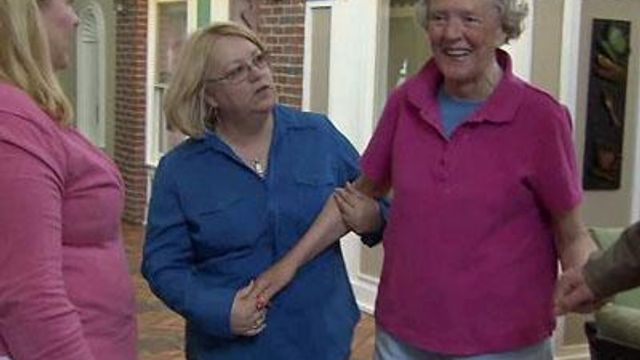Pace of Alzheimer's treatment, research among frustrations
Dave Simpson is dealing with the loss of his mother. Lois Shoolbred, 81, who is known affectionately as Lo Lo, has Alzheimer's, and her family is watching her fade and change, bit by bit. They are among the millions of families in America dealing with the disease.
Posted — UpdatedDr. Dan Kaufer, a dementia expert with UNC Health Care, says, “It's really, in many ways, a silent epidemic.”
Kaufer says he is frustrated by the slow progress in the treatment of Alzheimer’s. Unlike attacking a cancerous tumor or high blood pressure, gauging the success of dementia care remains painfully elusive.
“We can do pencil and paper test and measure how good their memory is, how good their language is, but we don't have good ways to measure how well we are able to maintain their sense of 'personhood',” he said.
UNC will soon take part in a clinical study of a potential Alzheimer's vaccine. But Kaufer says he's most encouraged by the prospect of brain imaging, that, if approved by the U.S. Food and Drug Administration, could allow doctors to identify the proteins linked to Alzheimer's earlier in a person’s life.
“We, hopefully, one day, will be able to diagnose people who are in the first stage of Alzheimer's disease before any clinical symptoms show up,” he said.
After a diagnosis, many families turn to a support group like Alzheimer’s North Carolina Inc. Alice Watkins, head of the group, said awareness of the disease and its treatment is growing, but the devastating diagnosis often overwhelms families with the emotional and logistical challenges of caring for a loved one.
“Let us begin the process of helping them cope with the disease, get them in a support group, find out what resources are needed,” she said.
Kaufer believes that Alzheimer’s care takes a family, like Lo Lo's, to cope. “The people who can make a difference are the families who see first hand what Alzheimer's does to their loved one,” he said.
• Credits
Copyright 2024 by Capitol Broadcasting Company. All rights reserved. This material may not be published, broadcast, rewritten or redistributed.






